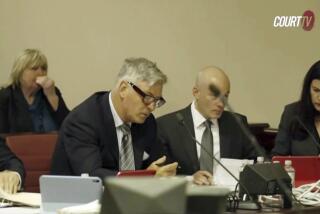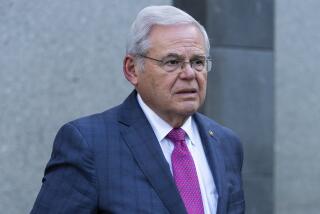Buckey Trial Jury--107 Hands Go Up : Legal proceeding: Prospective members are bluntly told that they could be on the case for the rest of the year.
- Share via
They couldn’t miss the television cameras outside the courtroom that morning when they walked down the hall. By noon, they knew who those cameras were for.
“Mr. Buckey,” the judge said, “will you stand, sir, and face the potential jurors?”
The second trial of Ray Buckey on eight child molestation counts began Tuesday with jury selection.
For six years now, Buckey has been styled publicly as “McMartin child molestation case defendant.” For the next six months, even a year, some among the 287 people in the jury assembly room with him on Tuesday will be styled collectively as the “McMartin jury,” sitting in court with Buckey every day and, eventually, sitting in judgment on him.
No wonder a little frisson , murmurs and raised eyebrows, moved across the room.
Buckey’s is an unusual case, the sequel to the longest criminal trial in U.S. history--and the judge, Stanley M. Weisberg, took unusual pains with the jurors after he walked across the hall from his courtroom, too small to hold the first group of prospective jurors.
The room was as solemn as a college orientation: Weisberg in front, robed in black, the rows of attentive jurors, the spillover ranging in front of the window sills. Knowing how much time he would be asking of jurors, Weisberg spoke “seriously and profoundly” about the right to a jury trial, which can only work if there are jurors willing to serve. Then:
“This is the case of Ray Buckey,” Weisberg said, almost superfluously. “The time estimate is somewhat longer than other trials. . . .”
It took Weisberg several minutes to cut to the chase: This trial may run from six months to a year. “These estimates are not precise, but I’m just trying to give you a ballpark figure,” Weisberg cautioned. “Perhaps six to eight months after jury selection, which means . . . (it) could take the balance of this year, possibly into early next year.”
In the front row, a man in a white shirt, who had been leaning forward to listen, slammed himself back into his seat and folded his arms.
Nonetheless, 107 of the 287 jurors raised their hands; spending as much as a year on the jury--six or seven hours a day, five days a week--would not work a hardship on them.
So from a box labeled “Hardship,” the other 180 or so were given two-page questionnaires asking them to explain how the case would cause them a hardship.
From a box labeled “Publicity,” the 107 were handed a four-page questionnaire. On the orange vinyl chairs in the hall, in empty seats in an empty courtroom, they filled out the form, a first test of patience:
--”Have you read or heard of this case?” it asked. “What have you read or heard?”
--”Have you or any close friend or relative been active in support of or opposition to either side in the McMartin case?”
--”Have you formed an opinion concerning the way in which the investigation was handled by law enforcement officials?” and “ . . . Have you formed an opinion concerning the way lawyers for the prosecution or the defense have conducted themselves in this case?”
Just who would be in the cast of attorneys had been settled only within an hour before jury selection.
The defense has been plagued by absences caused by the recurring back problems of attorney Danny Davis. Davis returned to court on Tuesday, the day after prosecutors had rumbled about replacing him with an “able-bodied attorney.” He inched in with a cane; Buckey carried his footstool for him, a molded plastic piece on which Davis rested his sciatic left leg.
To ensure that Davis’ health would not unduly delay the trial, a co-counsel was appointed, John J. Wagner, chiefly a civil attorney and former Bay Area prosecutor who represented Buckey’s sister and former co-defendant in her effort to regain her teaching credential. For the record, Wagner told reporters that the retrial is “the witch hunt of 1990” and that the defendant is innocent.
Deputy Dist. Atty. Joseph Martinez remarked that a co-counsel is acceptable “in lieu of anything better.” Like what? asked Weisberg. “I was just going to suggest,” said Martinez, “that Mr. Davis go to Lourdes and perhaps make a miraculous recovery.”
Davis allowed as how he “was happy he suggested I go to Lourdes rather than elsewhere.”
More to Read
Sign up for Essential California
The most important California stories and recommendations in your inbox every morning.
You may occasionally receive promotional content from the Los Angeles Times.














